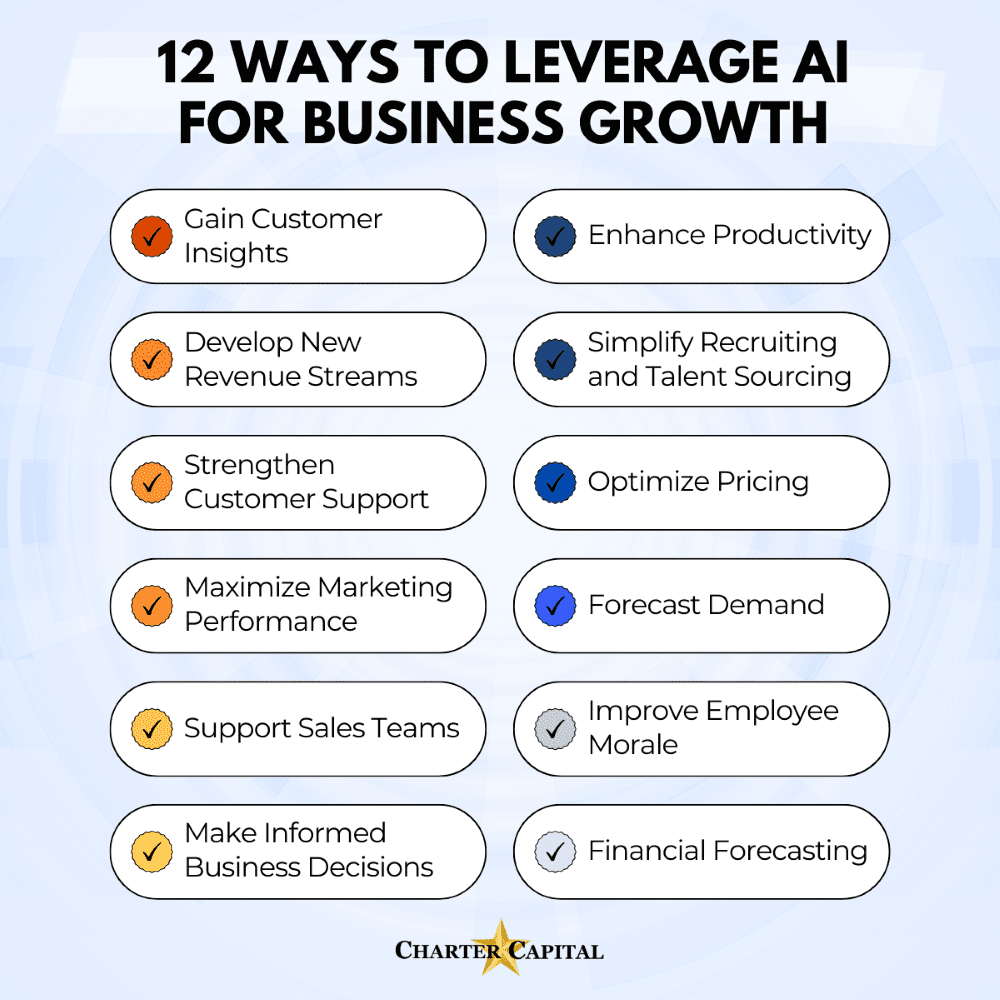
Integrating machine learning (ML) and artificial intelligence (AI) in business growth initiatives may seem like a daunting process, but the reality is that you’re probably already leveraging these tech innovations, or they’re available with tools you’re already using. In fact, nearly two-thirds of business leaders have already invested in AI and automation tools, HubSpot reports.
The high adoption rates are undoubtedly because there’s room for AI in virtually every business process. Integrating it can boost efficiency, improve decision-making, increase profit, and more, to stimulate business growth and make it easier for your company to scale.
What Are Artificial Intelligence and Machine Learning?
Before we begin, it’s helpful to understand what AI and ML are and explore common examples.
Artificial Intelligence (AI)
Programs that leverage AI mimic human thinking. They can perform tasks and “learn.” Alexa and Siri, the voice assistants, are powered by AI.
Machine Learning (ML)
ML is a subset of AI. Programs that leverage it are powered by algorithms that create models to perform tasks. The programs analyze data sets to “learn.” Your antivirus software likely uses ML. It may not know every virus that exists, as new viruses emerge daily, but it knows the patterns viruses commonly exhibit and quarantines anything that looks suspicious.
Generative AI
Generative AI is getting a lot of press these days. It’s a form of ML. Generative AI programs analyze large amounts of data to produce content or perform tasks and attempt to mirror human behavior. ChatGPT, powered by Open AI, is one of the first well-known examples, though many software companies integrate it now.
12 Ways Small Businesses Can Leverage AI in Business Growth
Now, let’s look at some ways you can leverage AI to support your business growth.
1. Gaining Customer Insights
Because AI can scan large data sets and identify trends quickly, it can help you gain insights into your customer base and what they like. Frito Lay, for example, discovered that one in six residents in Frisco, Texas, is of Indian descent, Fortune reports. The company already had a spicy chip that performed well in India, so it began selling it in Frisco with great success.
If you’d like to apply this on a smaller scale, consider implementing a customer relationship management (CRM) tool that leverages AI or ensure your marketing team has access to analytics tools that can analyze customer data for patterns.
2. Developing New Revenue Streams
AI is now used to identify ways businesses can create new revenue streams. For example, a new medication for treating pulmonary fibrosis that was created with AI is now in clinical trials, Clinical Trials Arena notes. TaylorMade jumped on the bandwagon with AI-designed golf clubs, too, as Sports Illustrated reports.
3. Strengthening Customer Support
Four in five businesses that improve the customer experience report greater revenue, Dimension Data reports. Thankfully, AI is seemingly everywhere in customer service today. For instance, chatbots field customer concerns or route customers to the information they need. Customer support software also routes people to the right agent based on details like the product involved, account size, number of recent calls, and preferred language.
4. Maximizing Marketing Performance
AI-driven marketing has exploded in recent years. Marketing teams are leveraging generative AI to streamline content creation, such as blogs and graphics. Many paid advertising platforms also make real-time campaign adjustments for bidding or to determine which ad content is most likely to convert and should, therefore, be displayed. Predictive analysis gauges how customers are likely to behave and who should be targeted.
AI is also used in personalization, which makes campaigns more effective and enhances the customer experience. For instance, websites can be “trained” to display different content based on the visitor. It can also help provide personalized recommendations on websites and in email campaigns.
5. Supporting Sales Teams
Sales teams are more effective and efficient with AI-driven CRMs. Many offer routing tools to ensure the right representative receives each lead. Leads can also be scored through AI, making it easier for teams to prioritize leads most likely to convert.
6. Making Informed Business Decisions
Nearly two-thirds of business leaders are already leveraging AI to make more informed operations and maintenance decisions, PwC research shows. At a basic level, this includes data analysis to gauge success. However, programs can also make predictions or conduct multiple simulations at once to help leaders make choices that will lead to the best possible outcome.
7. Enhancing Productivity
If your business is completing any administrative tasks on a recurring basis, chances are those tasks can be automated. This not only saves time but allows employees to focus on customers and can boost morale, too – all of which is helpful when you’re trying to grow your business.
Operational efficiency skyrockets when automation is leveraged to manage repetitive tasks. For instance, AI tools can listen to meetings and convert discussions into condensed notes. Project management tools allow you to scan handwritten notes and automatically transcribe them.
Automation is also used heavily in communication, such as reaching out to customers with marketing messages at the right time, sending invoices, and following up when customers don’t take action.
8. Simplifying Recruiting and Talent Sourcing
Most HR departments at large companies are already leveraging AI in some capacity. For instance, various programs scan resumes to create a shortlist of candidates. Some will automatically send “thanks for your time” messages to people who don’t make the cut, then ask the remaining candidates to answer questions or complete assessments.
9. Optimizing Pricing
Businesses that increase prices just one percent boost operating profit by almost nine percent on average, provided they don’t lose sales in the process, McKinsey studies show. However, avoiding a drop in sales is easier said than done. ML makes it easy for brands to see which products can bear an increase and is now commonplace in pricing optimizations. Amazon, for example, leverages it.
10. Forecasting Demand
AI can help you identify when to ramp up production and where need will increase. For instance, a roofing producer wanted to understand which areas would be impacted by hurricane season, Climate.ai reports. Knowing how significant the impact would be and which areas would need the most help rebuilding would allow the company to have supplies waiting in advance. AI predicted that Florida would be hit hard. The company increased production of shingles commonly used in Florida and had them ready when the hurricane hit. The AI predictions were more accurate than those made by climatologists, so other suppliers were unprepared for the rise in demand. The company leveraging AI, however, captured an additional $15 million in sales.
11. Improving Employee Morale
Companies with highly engaged employees are 21 percent more profitable, Forbes reports. Newer AI programs can identify dips in performance that signal an employee is struggling and needs support, according to the World Economic Forum. This allows HR and leadership to step in to help prevent employee burnout. Companies are leveraging it to create tailored compensation plans. It can also nudge them toward the right resources in real-time and assist with schedule optimization.
12. Financial Forecasting
Businesses need accurate financial forecasts to measure progress, identify potential issues, and make informed spending decisions. Advanced business finance and accounting tools take care of the forecasting for you, so it’s easier to see how you’re performing, when you can invest, and when you might have a cash flow shortfall that needs to be addressed.
Grow Your Business with Invoice Factoring
Whether you need cash to invest in new AI technology, for other growth initiatives, or to bridge cash flow gaps as you scale, factoring can help by unlocking the capital in your B2B invoices. To learn more or get started, request a complimentary factoring rate quote from Charter Capital.

- 6 Types of Business Insurance You Can’t Afford to Ignore - July 22, 2024
- Handling Payment Delays as a Government Contractor - June 24, 2024
- Quick Guide: Invoice Factoring for Security Companies - May 27, 2024

